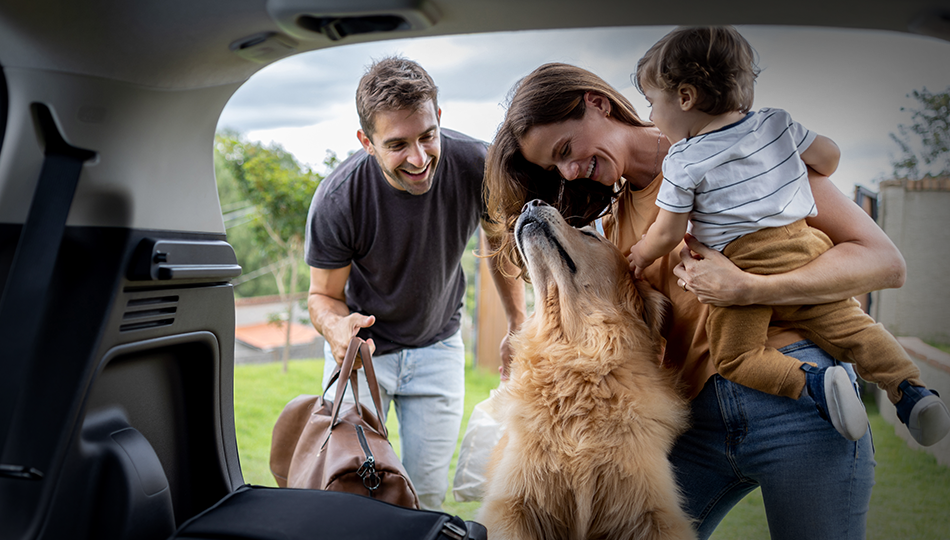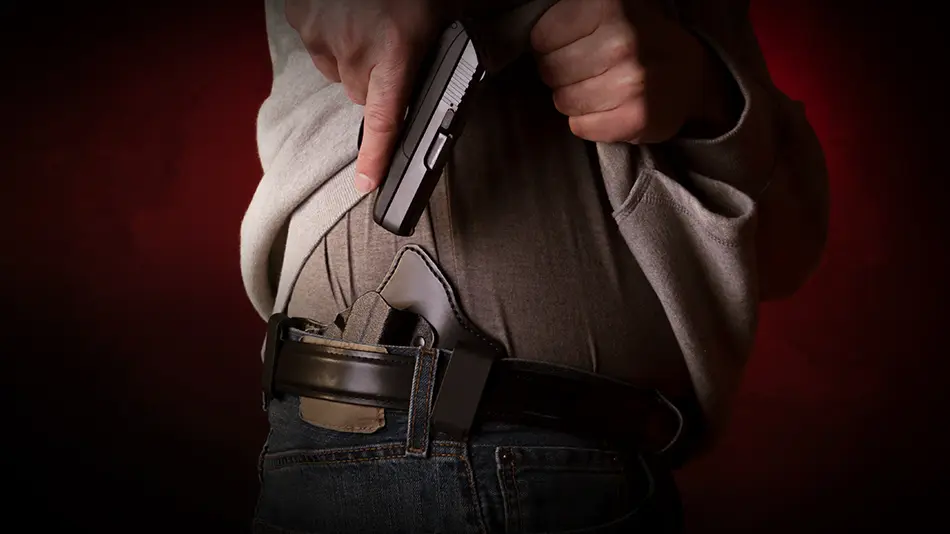The following is a video transcript.
Suppose you’ve just been involved in a self-defense incident. You drew your weapon and fired a shot, wounding and potentially even killing your attacker. There is a body lying on the floor, and you need to get help fast. You grab the phone and dial 911…
If you used or displayed your gun, you need to call 911 as soon as possible after the incident. Be aware all 911 calls are recorded and anything you say can (and more than likely will) be used against you.
You are experiencing a level of stress unlike anything you have ever felt before; you are panicked, emotional, and your adrenaline is flowing through your body. Because you are in a traumatic state, it is likely you will not remember things clearly and may even forget some details of the incident.
Therefore, it is important that you prepare a comprehensive self-defense plan to get the help you need and avoid incriminating yourself. Even if you did everything right during the incident, what you do and say to the police and the 911 operator could make the difference between spending the night at home or in jail.
As U.S. LawShield Independent Program Attorneys, we have years of experience defending thousands of members and have seen and experienced numerous 911 interactions. In this video, we will help you create a comprehensive plan so you know what to do and what NOT to do when calling 911 after a self-defense incident.
The 911 Call
DO NOT wait to call 911. After a self-defense incident, we recommend you call 911 as soon as possible.
DO NOT GIVE THE OPERATOR A DETAILED DISCUSSION OF WHAT HAPPENED. When the operator answers, BE BRIEF. Say as little as possible. Remember, all 911 calls are recorded and may be used as evidence against you in a criminal prosecution or even a civil lawsuit.
If you are charged later down the road, prosecutors will have a field day analyzing each and every word you said to the operator, looking for inconsistencies in your statement and the physical evidence discovered by the police. What were once innocent misstatements on the phone with the 911 operator can be painted by the prosecutor as attempts to fabricate or lie in front of a jury.
DO NOT use words like “killed” when speaking about the incident to the 911 operator. Don’t even mention that you drew your weapon or fired it unless necessary. Only give them enough information so they can send the appropriate emergency services personnel.
DO tell the operator the following:
- Your name;
- Your location;
- That you are the victim of a crime;
- What services are needed (such as police, EMS, or fire);
- A general description of what you are wearing to avoid any confusion by police when they arrive (as in you’re a 5′ 8″ female wearing a blue shirt and pink pants); and
- Essential logistical information that you may need to convey (like you have the intruder held at gunpoint in your living room), but as little information as possible.
Confirm your address before hanging up.
It’s important that you confirm the operator has the correct address before hanging up so that they can quickly and accurately dispatch the help you need to your location.
Hang up the phone.
You are under no obligation to stay on the line, so end the call after providing the necessary information. Operators are trained to keep you talking on the phone and will try to elicit as much information as possible from you before the police arrive. The operator may attempt to call you back, but you have no legal obligation to answer.
Call THE U.S. LAWSHIELD EMERGENCY HOTLINE
Call the U.S. LawShield Emergency Hotline (the number located on the back of your member card) and follow the instructions the Independent Program Attorney gives you. Your Independent Program Attorney will assist you through the process. Try to make this call in an area where you can be alone and can speak privately.
If you cannot get to an area where you are alone, simply give the attorney your name, member number, location, and what type of emergency you have experienced—like a shooting, drawn firearm, etc.
If you have time, give the name and phone number of an emergency contact—in the unfortunate event the police arrest you.
Before the police arrive…
If possible, make sure your firearm is returned to safekeeping. Remember, the police are there to secure the scene and gather evidence. When they arrive, they are dealing with limited information and will not immediately know who the victim is and who is the bad guy. It can create the wrong impression when the police arrive and your gun is in your hand and the other guy is on the ground.
Remember, an Independent Program Attorney is ready to assist you and is just a phone call away. If you have any questions regarding how to navigate the 911 call after a self-defense incident, call U.S. LawShield and ask to speak to an Independent Program Attorney.





Very good information to know. Is it possible for US & Texas Lawshield to create a few scenario videos (2-3 minutes in length) showing the proper steps to take when an attacker has been shot by a member, in the street and in the home? The videos would take the viewers from just before the attack occurred until the arrival of the police and the member is taken into custody.
My suggestion: pre-program the TLS emergency number in your phone’s contact list so all you have to do is press your home button and say “Call Texas Law Shield”. You may not be able to easily get out the little card and look for the number when in the middle of such a stressful situation.
Perfect answer and exactly how to handle the situation!!
1) most 911 systems will actually continually track your phone AFTER you hang up.
2) after talking with the attorney, i would power off and back on your phone (if an iPhone) as that will require a passcode to open again, not just your fingerprint. police CAN force you to use your fingerprint, but cannot require your passcode from you.
As always appreciate great counsel
This was helpful but I would like to read a possible script that would be said to the 911 operator. How do you explain what happened and that you shot the intruder?
This all sounds great BUT after you call 911 and give the information THEN try to call Law Shield, you can’t use your phone to call anybody because the 911 operator will continually call you back as they have your number on their computer. You almost have to have a separate phone to call Law Shield.
I’ve been paying my dues & ive never gotten a membership card
Hello Robert and thank you for bringing this to our attention. Please call our Member Services team at (877) 448-6839 and a representative will be happy to help you with your membership card.
Thank you all for this very important information.
Omg I had no idea I was under no obligation to stay on the phone with a 911 operator. I thought it was illegal to NOT answer their call back when you hang up. This was extremely informational. Thank you!!
Thank you for this very helpful video. I encourage everyone to practice this as a drill.
When returning your gun to safe keeping, if you have others do not put it with them or they will take all weapons because they dont know which one you used, this will avoid a lot of hassle for you in the long run as well as leaving you able to protect your home afterwards! Also I would tell them that you need two ambulances because when your adrenaline is running you may have been injured as well and not even realize it, so one for you and one for the attacker or attackers.
I just want to thank y’all for all of the information y’all provide.
The video was awesome
You guys are awesome I’ve been a member for at least 2 years and I plan on staying a member as long as I possibly can thank you for your service
Suggest everyone take the Law Shield Gun Law Seminar in your area. This topic is well covered in the seminar. Have taken it 2 times and will probably continue to repeat taking the seminar to keep their suggestions in the forefront.
A word of advice. DO NOT USE PHOTO IDENTIFICATION OR FINGER PRINT RECOGNITION ON YOUR PHONE FOR SECURITY. POLICE DO NOT NEED YOUR PERMISSION TO GAIN ACCESS TO YOUR CELL PHONE WITH THESE TWO METHODS. ALWAYS USE A PASSCODE OF SOME TYPE.
DON’T USE YOUR D.O.B. OR SSN AS YOUR CODE EITHER. THEY CAN OBTAIN THESE FROM NORMAL DMV RECORDS.
I have U.S. Law Shield on my Iphone’s ‘Favorites’ listing. In that way, I need only touch that selection to call them – and my customer number is stored as a Note within that particular contact. After I call 911, I expect I’ll put the phone on ‘Do Not Disturb’. Hopefully, that will divert call backs from the 911 operator. (But maybe I’m wrong. Maybe the 911 system can break thru the ‘Do Not Disturb’ setting.)
This is an excellent video.
It is important to know what to do and more importantly, what not to do or say.
Great info, thank you. What should the script be when briefly describing the scenario if you have already shot and killed the intruder?
Very informative information in your article. Huge “thank yous” for always going above and beyond to keep us educated. Your efforts and the peace of mind this membership gives me, as a single woman with my CC License, makes this worth every penny!